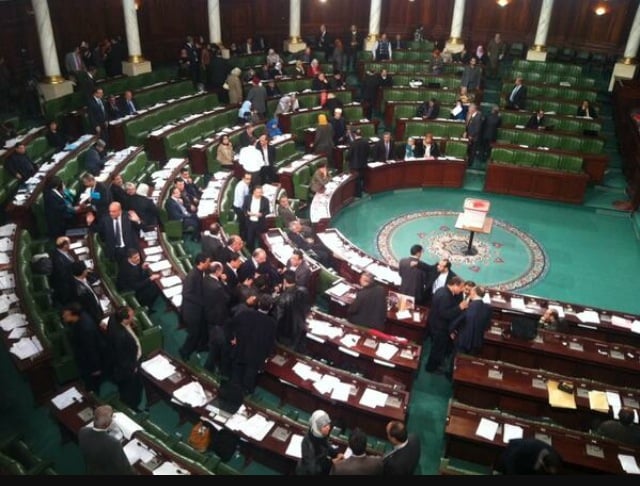
Al Bawsala tweets picture of Tunisia’s National Constituent Assembly deliberating provisions on the draft constitution a week before the three year anniversary of the Arab Spring
On January 9, Ali Larayedh dutifully resigned as the Prime Minister of Tunisia, fulfilling his promise to end the political deadlock in Tunisia following the crises that ensued as a result of the assassination of secular politician, Mohamed Brahmi in July 2013. Although strikes and protests have plagued the country since 2011, the transition to the interim government on January 9 was relatively peaceful, and news agencies reported little bloodshed following the change in power. While Tunisia avoided the extreme violence that enveloped Egypt in 2013, it faced its fair share of strikes and protests largely in response to Tunisia’s ailing economy. The assassination of one of the country’s foremost politicians threatened to throw Tunisia into a spiral of chaos. However, Prime Minister Ali Larayedh, attempting to avoid a Morsi-like fate, acquiesced to demands for his resignation, which ultimately ended the political gridlock in the country.
Within this political backdrop, Tunisia’s National Constituent Assembly (NCA) is attempting to further democratic reform by ratifying a new national constitution. The NCA attempted to finalize the remaining provisions of the draft constitution to commemorate the third anniversary of the Arab Spring. What is most remarkable about the Tunisian draft constitution is the unprecedented transparency involved during the drafting process as well as record levels of participation from non-governmental agencies during the drafts development. Using tools such as Twitter, Al Bawsala, a non-governmental organization, monitors the NCA from the main chamber of parliament, publicizing each member’s vote and debates during proceedings. Already, human rights organizations such as Human Rights Watch are applauding the efforts of the constitutional commission charged with drafting the constitution, and the Carter Center even declared that “the draft underscores the [Tunisian] authorities’ strong commitment to democratic reform”. Tunisia’s constitutional commission allowed such non-governmental organizations to review drafts of the constitution as well as make ongoing recommendations to specific provisions.
Despite progress, Tunisia is not yet the exemplary bastion of democratic reform; human rights organizations still demand greater clarity from the draft constitution, particularly on the provisions relating to judicial independence. Ongoing strikes and protests highlight the country’s whopping 17 percent unemployment rate. The rallying cry of the Arab Spring called for free and fair elections, but adherence to the rule of law itself, a vital ingredient in making any democratic transition successful, was largely ignored in the years following the revolutionary changes in the region. Better late than never, Tunisia, the country that sparked the Arab Spring, is now attempting to usher in a new wave of reform, and so it seems, this time with respect to the rule of law. A greater emphasis on civil and human rights highlighted in the draft constitution, as well as the collaborative transference of power to the interim government, indicate a major shift in policy in the country.
How was it possible that Ali Larayedh’s Ennahda party, an Islamist leaning group, along with secular and non-secular opposition groups, successfully transferred power without the aftermath resulting in chaotic violence? Some argue that Tunisia is ripe for transition due to a large part of its population that is well-educated. Others claim that, unlike its neighbor Egypt, Tunisia is less reliant on foreign military aid and that Tunisian politicians recognize the need to foster the country’s stability in order to attract investment and bolster economic ties with its trading partners. This was made evident after the Arab Spring when Tunisia’s economy crashed and inflation sky rocketed to unparalleled levels (although 2012 saw a partial recovery with a three percent growth in the country’s GDP). Tunisia which previously marketed itself as a country safe for investment was dealt a huge economic fallback following the revolution, exhumed even further by the political upheaval that later rocked the region as a whole.
What Tunisia’s current political climate indicates, and as Tunisia attempts to re-define its image as both a country mindful of democratic reform as well as a country ready for economic stability, is that factors such as Islamism may be less important to democratic reform than Western foreign policy analysts would like to believe. Instead, variables conclusive to almost every stable democratic country in the world are just as applicable to Tunisia, a country ready for the rule of law and a government ready to respect it.
Whether Tunisia turns into a stronghold of stability and democratic governance in the coming years is uncertain, but given the region’s current volatility, Tunisia seems to be light-years ahead of its neighbors.